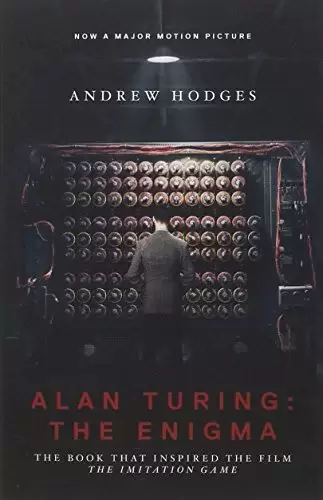
Book Description
A NEW YORK TIMES BESTSELLER
The official book behind the Academy Award-winning film The Imitation Game, starring Benedict Cumberbatch and Keira Knightley
It is only a slight exaggeration to say that the British mathematician Alan Turing (1912-1954) saved the Allies from the Nazis, invented the computer and artificial intelligence, and anticipated gay liberation by decades–all before his suicide at age forty-one. This New York Times–bestselling biography of the founder of computer science, with a new preface by the author that addresses Turing’s royal pardon in 2013, is the definitive account of an extraordinary mind and life.
Capturing both the inner and outer drama of Turing’s life, Andrew Hodges tells how Turing’s revolutionary idea of 1936–the concept of a universal machine–laid the foundation for the modern computer and how Turing brought the idea to practical realization in 1945 with his electronic design. The book also tells how this work was directly related to Turing’s leading role in breaking the German Enigma ciphers during World War II, a scientific triumph that was critical to Allied victory in the Atlantic. At the same time, this is the tragic account of a man who, despite his wartime service, was eventually arrested, stripped of his security clearance, and forced to undergo a humiliating treatment program–all for trying to live honestly in a society that defined homosexuality as a crime.
The inspiration for a major motion picture starring Benedict Cumberbatch and Keira Knightley, Alan Turing: The Enigma is a gripping story of mathematics, computers, cryptography, and homosexual persecution.
Alan Turing died in 1954, but the themes of his life epitomize the turn of the millennium. A pure mathematician from a tradition that prided itself on its impracticality, Turing laid the foundations for modern computer science, writes Andrew Hodges:
Alan had proved that there was no “miraculous machine” that could solve all mathematical problems, but in the process he had discovered something almost equally miraculous, the idea of a universal machine that could take over the work of any machine.
During World War II, Turing was the intellectual star of Bletchley Park, the secret British cryptography unit. His work cracking the German’s Enigma machine code was, in many ways, the first triumph of computer science. And Turing died because his identity as a homosexual was incompatible with cold-war ideas of security, implemented with machines and remorseless logic: “It was his own invention, and it killed the goose that laid the golden eggs.”
Andrew Hodges’s remarkable insight weaves Turing’s mathematical and computer work with his personal life to produce one of the best biographies of our time, and the basis of the Derek Jacobi movie Breaking the Code. Hodges has the mathematical knowledge to explain the intellectual significance of Turing’s work, while never losing sight of the human and social picture:
In this sense his life belied his work, for it could not be contained by the discrete state machine. At every stage his life raised questions about the connection (or lack of it) between the mind and the body, thought and action, intelligence and operations, science and society, the individual and history.
And Hodges admits what all biographers know, but few admit, about their subjects: “his inner code remains unbroken.” Alan Turing is still an enigma. –Mary Ellen Curtin
Table of Contents
PART ONE The Logical
Chapter 1 Esprit de Corps
Chapter 2 The Spirit of Truth
Chapter 3 New Men
Chapter 4 The Relay Race
PART TWO THE PHYSICAL
Chapter 5 Running Up
Chapter 6 Mercury Delayed
Chapter 7 The Greenwood Tree
Chapter 8 On the Beach
中文:
书名:Alan Turing: The Enigma: The Book That Inspired the Film “The Imitation Game”
A NEW YORK TIMES BESTSELLER
奥斯卡获奖影片背后的官方书籍 模仿游戏本尼迪克特·康伯巴奇和凯拉·奈特莉主演
毫不夸张地说,英国数学家艾伦·图灵(Alan Turing,1912-1954)在41岁自杀之前,从纳粹手中拯救了盟军,发明了计算机和人工智能,并预见到同性恋解放了几十年。这 New York Times-这位计算机科学创始人的畅销传记,加上作者在2013年发表的一篇新的序言,阐述了图灵的皇家赦免,是对非凡心灵和生活的明确描述。
安德鲁·霍奇斯抓住了图灵生活的内在和外在的戏剧性,讲述了图灵1936年的革命性想法如何为现代计算机奠定了基础,以及图灵如何在1945年通过他的电子设计将这一想法付诸实践。这本书还讲述了这项工作是如何与图灵在第二次世界大战期间破解德国谜语密码的主导作用直接相关的,这一科学胜利对盟军在大西洋上的胜利至关重要。与此同时,这是一个悲惨的故事,一个人,尽管他在战时服役,但最终被逮捕,剥夺了他的安全许可,并被迫接受耻辱的待遇计划,所有这些都是因为他试图在一个将同性恋定义为犯罪的社会中诚实地生活。
本尼迪克特·康伯巴奇和凯拉·奈特莉主演的一部主要电影的灵感来源是, 艾伦·图灵:谜团 是一个关于数学、计算机、密码学和同性恋迫害的扣人心弦的故事。
艾伦·图灵于1954年去世,但他一生的主题是世纪之交的缩影。图灵是一位纯粹的数学家,出身于以不切实际为荣的传统,他为现代计算机科学奠定了基础,安德鲁·霍奇斯写道:
艾伦已经证明,不存在能够解决所有数学问题的神奇机器,但在这个过程中,他发现了几乎同样神奇的东西,那就是一台可以取代 any machine.
在第二次世界大战期间,图灵是英国秘密密码单位布莱奇利公园的知识分子明星。从很多方面来说,他破解德国之谜机器代码的工作是计算机科学的第一次胜利。图灵之所以死,是因为他作为同性恋者的身份与冷战时期的安全理念不相容,而冷战时期的安全理念是通过机器和无情的逻辑实现的:这是他自己的发明,它杀死了下金蛋的鹅。
安德鲁·霍奇斯非凡的洞察力将图灵的数学和计算机工作与他的个人生活交织在一起,产生了我们这个时代最好的传记之一,也是德里克·雅各比电影的基础 破解密码。霍奇斯拥有数学知识,可以解释图灵作品的智力意义,同时永远不会忘记人类和社会的图景:
从这个意义上说,他的生活掩盖了他的工作,因为它不能被离散的状态机所控制。在他生活的每个阶段,他都提出了关于心灵与身体、思想与行动、智力与行动、科学与社会、个人与历史之间的联系(或缺乏联系)的问题。
霍奇斯承认,所有传记作家都知道,但很少有人承认,关于他们的主题,他的内心准则仍然没有被打破。艾伦·图灵仍然是一个谜。 #8211;玛丽·艾伦·柯廷
目录表
PART ONE The Logical
第一章兵团精神
第二章真理的精神
第三章新人
第四章接力赛
第二部分:体能
第5章用完
第六章水星延迟
第七章绿林树
第八章关于海滩
评论前必须登录!
注册